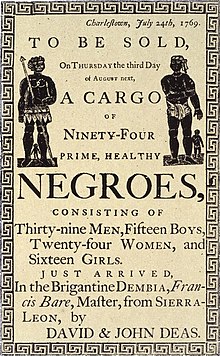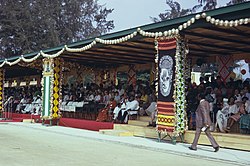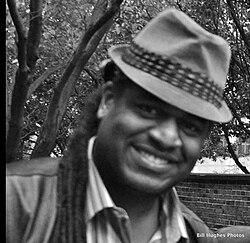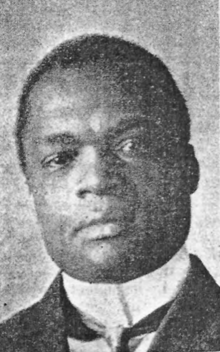Portal:Pan-Africanism
IntroductionWelcome to the Pan-Africanism portal!
Bienvenue sur le portail panafricanisme!   Pan-Africanism is a worldwide movement that aims to encourage and strengthen bonds of solidarity between all indigenous peoples and diasporas of African ancestry. Based on a common goal dating back to the Atlantic slave trade, the movement extends beyond continental Africans with a substantial support base among the African diaspora in the Americas and Europe. Pan-Africanism can be said to have its origins in the struggles of the African people against enslavement and colonization and this struggle may be traced back to the first resistance on slave ships—rebellions and suicides—through the constant plantation and colonial uprisings and the "Back to Africa" movements of the 19th century. Based on the belief that unity is vital to economic, social, and political progress, it aims to "unify and uplift" people of African ancestry. (Full article...) Selected articleBlack Power is a political slogan and a name for various associated ideologies aimed at achieving self-determination for people of African descent. It is used primarily, but not exclusively, by African Americans in the United States. The Black Power movement was prominent in the late 1960s and early 1970s, emphasizing racial pride and the creation of black political and cultural institutions to nurture and promote black collective interests and advance black values. Selected biography
Henry Sylvester Williams (15 February 1869 – 26 March 1911) was a Trinidadian lawyer, councillor and writer, most noted for his involvement in the Pan-African Movement. As a young man he went to North America to further his education, and subsequently to Britain, where in 1897 he formed the African Association to challenge paternalism, racism and imperialism; the association aimed to "promote and protect the interests of all subjects claiming African descent, wholly or in part, in British colonies and other place, especially Africa, by circulating accurate information on all subjects affecting their rights and privileges as subjects of the British Empire, by direct appeals to the Imperial and local Governments." In 1900 Williams organised the First Pan-African Conference, held at Westminster Town Hall in London. In 1903 he went to practise as a barrister in South Africa, becoming the first black man to be called to the bar in the Cape Colony. Selected history  The Atlantic slave trade or transatlantic slave trade involved the transportation by slave traders of enslaved African people, mainly to the Americas. The slave trade regularly used the triangular trade route and its Middle Passage, and existed from the 16th to the 19th centuries. The vast majority of those who were enslaved and transported in the transatlantic slave trade were people from central and western Africa, who had been sold by other West Africans to Western European slave traders (with a small number being captured directly by the slave traders in coastal raids), who brought them to the Americas. The South Atlantic and Caribbean economies especially were dependent on the supply of secure labour for the production of commodity crops, making goods and clothing to sell in Europe. This was crucial to those western European countries which, in the late 17th and 18th centuries, were vying with each other to create overseas empires. The Portuguese were the first to engage in the Atlantic slave trade in the 16th century. In 1526, they completed the first transatlantic slave voyage to Brazil, and other European countries soon followed. Shipowners regarded the slaves as cargo to be transported to the Americas as quickly and cheaply as possible, there to be sold to work on coffee, tobacco, cocoa, sugar and cotton plantations, gold and silver mines, rice fields, construction industry, cutting timber for ships, in skilled labour, and as domestic servants. The first Africans imported to the English colonies were classified as "indentured servants", like workers coming from England, and also as "apprentices for life". By the middle of the 17th century, slavery had hardened as a racial caste, with the slaves and their offspring being legally the property of their owners, and children born to slave mothers were also slaves. As property, the people were considered merchandise or units of labour, and were sold at markets with other goods and services. Selected cultureAfrican-American culture, also known as Black American culture, refers to the contributions of African Americans to the culture of the United States, either as part of or distinct from mainstream American culture. The distinct identity of African-American culture is rooted in the historical experience of the African-American people, including the Middle Passage. The culture is both distinct and enormously influential on American and global worldwide culture as a whole. African-American culture is primarily rooted in West and Central Africa. Understanding its identity within the culture of the United States it is, in the anthropological sense, conscious of its origins as largely a blend of West and Central African cultures. Although slavery greatly restricted the ability of African Americans to practice their original cultural traditions, many practices, values and beliefs survived, and over time have modified and/or blended with European cultures and other cultures such as that of Native Americans. African-American identity was established during the slavery period, producing a dynamic culture that has had and continues to have a profound impact on American culture as a whole, as well as that of the broader world. Elaborate rituals and ceremonies were a significant part of African Americans' ancestral culture. Many West African societies traditionally believed that spirits dwelled in their surrounding nature. From this disposition, they treated their environment with mindful care. They also generally believed that a spiritual life source existed after death, and that ancestors in this spiritual realm could then mediate between the supreme creator and the living. Honor and prayer was displayed to these "ancient ones", the spirit of those past. West Africans also believed in spiritual possession. Selected imagesOrganisationsAll-African People's Revolutionary Party · African Society for Cultural Relations with Independent Africa · African Unification Front · African Union · African Queens and Women Cultural Leaders Network · Conseil de l'Entente · Convention People's Party · East African Community · Economic Freedom Fighters · Global Afrikan Congress · International African Service Bureau · International League for Darker People · Organisation of African Unity · Pan African Association · Pan-African Congress · Pan Africanist Congress of Azania · Rassemblement Démocratique Africain · Pan Africa Chemistry Network · Pan African Federation of Accountants · Pan-African Freedom Movement for East and Central Africa · Sahara and Sahel Observatory · UNIA-ACL · ZANU–PF
See also
& Festivals Photo by Helinä Rautavaara (1977) Publications
Films and TVAudios and videosDid you know ...that A. F. James MacArthur (pictured) broadcast his standoff with the Baltimore Police Department to 10,000 online listeners?
Selected quotesIn addressing imperialism at a Salisbury (Southern Rhodesia) meeting held on 9 April 1962, the former President of Zimbabwe Robert Mugabe delivered the following speech:
Pan-Africanism topicsCategoriesThings you can do
Related portalsAssociated WikimediaThe following Wikimedia Foundation sister projects provide more on this subject:
Discover Wikipedia using portals | |||||||||||||||||||































